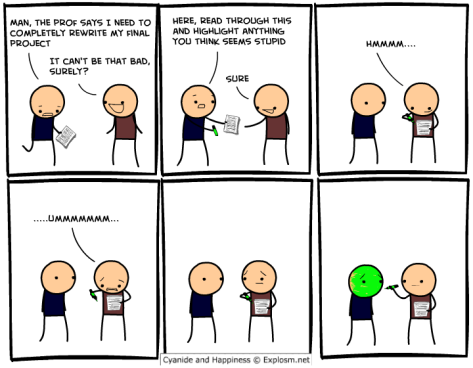 “If you are writing without zest, without gusto, you are only half a writer.”
“If you are writing without zest, without gusto, you are only half a writer.”
Were I inclined to get a tattoo, I would probably have the above sentence etched into my forehead, that way every glance in the mirror might double as a piquant reminder: don’t forget to love what you do.
For the first thing a writer should be is – excited. He should be a thing of fevers and enthusiasms. Without such vigor, he might as well be picking out peaches or digging ditches; God knows it would be better for his health.
And there, in one paragraph, is The Reason Why you should read this book, Zen in the Art of Writing. It is a collection of eleven superlative essays, written by a writer who revels in his craft. Bradbury. Ray Bradbury. He of mechanical hounds and dark carnivals and wine made from dandelions. When I say he revels in what he does, you’d better believe it. Just picture, if you will, a man who throws himself into writing like a child into a freshly-raked pile of leaves. That’s Bradbury.
From “Drunk, and In Charge of a Bicycle”:
… you look around at a community of notions held by other writers, other intellectuals, and they make you blush with guilt. Writing is supposed to be difficult, agonizing, a dreadful exercise, a terrible occupation.
But, you see, my stories have led me through my life. They shout, I follow. They run up and bite me on the leg – I respond by writing down everything that goes on during the bite. When I finish, the idea lets go, and runs off.
That is the kind of life I’ve had. Drunk, and in charge of a bicycle, as an Irish police report once put it. Drunk with life, that is, and not knowing where off to next. But you’re on your way before dawn. And the trip? Exactly one half terror, exactly one half exhilaration.
From “The Secret Mind”:
Self-consciousness is the enemy of all art, be it acting, writing, painting, or living itself, which is the greatest art of all.
From “Zen in the Art of Writing”:
The artist learns what to leave out.
His greatest art will often be what he does not say, what he leaves out, his ability to state simply with clear emotion, the way he wants to go.
The artist must work so hard, so long, that a brain develops and lives, all of itself, in his fingers.
Writing is hard, yes. Mr. Bradbury would be the first to tell you so. But it need not be – indeed, should not be – a bland or joyless exercise. It should not merely be a matter of dropping in one word after the other without screwing up the grammar. If that’s how it feels, it’s time to step back and take a look at what you’re missing.
Stoop down. Look low. See that?
Buried beneath the pyramid of elements and style, beneath the smelly carcass of “writer’s block” and the panicky butterflies that circle it – beneath all of that you may find the body of a child. Set him loose. He knows where the leaf pile is.


